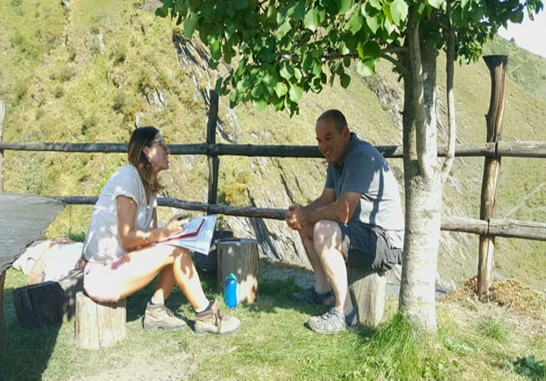
In August 2019, I went up one steep, narrow, and absolutely stunning mountain road – claimed by the BBC one of the World’s Most Dangerous Roads – into a remote Tusheti Protected Areas in Georgia. The aim was to interview 20 local families, rangers and PA Administartion on their perceptions of the Protected Areas establishmet and the subsequent tourism development in Tusheti, as part of my Research Project for the Master of Science (MSc) degree in Responsible Tourism Management.

Last week I finally submitted my dissertation on the local Tusheti community perceptions. It was a fascinating project to work on – the People, the place and the subject of the research made it an incredible and unforgettable experience, worth much more than my degree (although, admittedly, it is nice to think of myself as a Master of Science 🙂
I am hoping to turn the work into various articles as the results can hopefully shed some light on what the local people in Georgia really think of tourism in their destination, despite the government’s push for the continuous growth at all cost. It looks like, at least in Tusheti, the residents don’t want tourism at all costs!

For now, I am sharing a 250-word abstract of my work submitted as part of the dissertation.
This qualitative, organization-based research, conducted in close cooperation with the Caucasus Nature Fund (CNF), sought to explore the residents’ perceptions on the benefits and costs of the establishment of the Protected Area and subsequent tourism development in Tusheti Protected Areas (Tuheti PAs) in Georgia. The non-economic values were also explored. Understanding the resident’s perceptions and values was essential to developing practical recommendations to support positive community-Park relationship and responsible tourism, to enhance biodiversity conservation efforts for the CNF and its stakeholders.
20 semi-structured resident interviews were conducted in August 2019. Afterwards, five members of the PA administration were interviewed to discuss the initial findings and assess their perceptions on the relationship.
The findings revealed that most of the residents support the PA’s existence and perceive tourism as positive for Tusheti. The ‘economic benefits’ and ‘environmental and cultural preservation of Tusheti’ have emerged as the key themes. The concerns about potential damage to Tusheti if tourism grows too quickly have emerged as one of the key costs.
The positive sentiment towards tourism still prevails because the perceived costs don’t exceed the perceived benefits. However, the support for tourism could be lost if its growth threatens Tusheti’s natural and cultural integrity. This is in line with the Social Exchange Theory that has guided this study.
The perceived negative community-Park relationship can be improved through a more transparent and inclusive PA management and environmental education to foster better understanding of the importance of nature conservation in the Caucasus.

#Tusheti #tourism # ProtectedAreas #sustainabletourism #Georgia #community
